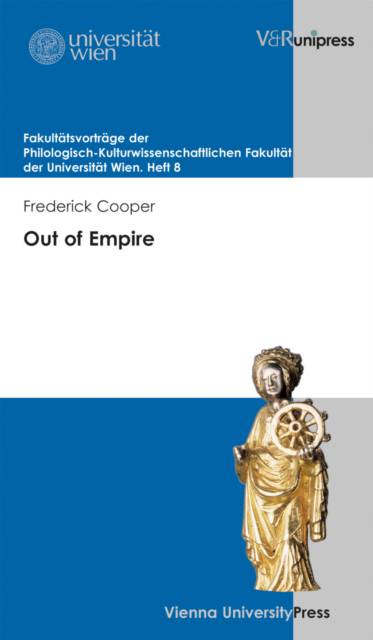
Bedankt voor het vertrouwen het afgelopen jaar! Om jou te bedanken bieden we GRATIS verzending (in België) aan op alles gedurende de hele maand januari.
- Afhalen na 1 uur in een winkel met voorraad
- In januari gratis thuislevering in België
- Ruim aanbod met 7 miljoen producten
Bedankt voor het vertrouwen het afgelopen jaar! Om jou te bedanken bieden we GRATIS verzending (in België) aan op alles gedurende de hele maand januari.
- Afhalen na 1 uur in een winkel met voorraad
- In januari gratis thuislevering in België
- Ruim aanbod met 7 miljoen producten
Zoeken
Out of Empire
Frederick Cooper
Paperback | Duits | Fakultätsvorträge der philologisch-kulturwissenschaftlichen Fakultät der Universität Wien | nr. 8
€ 22,95
+ 45 punten
Omschrijving
The history of decolonization is usually written backward, as if the end-point (a world of juridically equivalent nation-states) was known from the start and the only question was the obstacles to be overcome in order to get there. But if we ask how leaders in France, Britain, and their African colonies saw the political possibilities at the end of World War II, the routes out of colonial empire appear more varied. Some Africans sought equal rights within empire, others to federate among themselves; some sought independence. In London or Paris, officials realized they had to reform colonial empires, but not necessarily give them up. The idea of odevelopmento became a way to assert that empire could be made both more productive and more legitimate. Frederick Cooper explores how these alternative possibilities narrowed between 1945 and approximately 1960. The idea that polities were composite gave way to the fiction of a world of juridically equivalent nation-states. Some African leaders predicted that a world so divided might perpetuate rather than eliminate the powerlessness and poverty against which they were mobilizing.
Specificaties
Betrokkenen
- Auteur(s):
- Uitgeverij:
Inhoud
- Aantal bladzijden:
- 30
- Taal:
- Duits
- Reeks:
- Reeksnummer:
- nr. 8
Eigenschappen
- Productcode (EAN):
- 9783847100973
- Verschijningsdatum:
- 20/02/2013
- Uitvoering:
- Paperback
- Formaat:
- Trade paperback (VS)
- Afmetingen:
- 121 mm x 205 mm
- Gewicht:
- 321 g

Alleen bij Standaard Boekhandel
+ 45 punten op je klantenkaart van Standaard Boekhandel
Beoordelingen
We publiceren alleen reviews die voldoen aan de voorwaarden voor reviews. Bekijk onze voorwaarden voor reviews.









